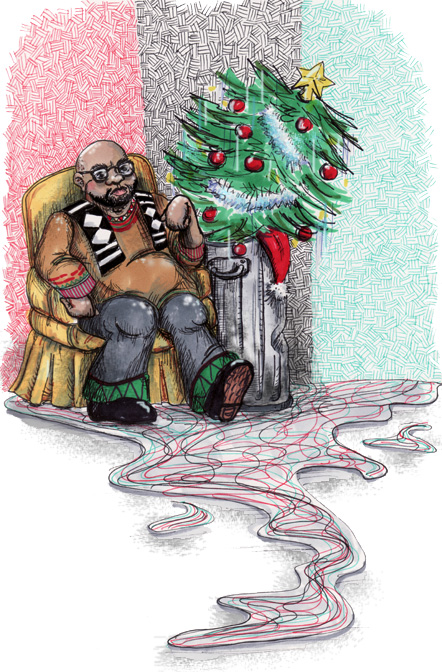Most everyone knows the basic story of what Christmas commemorates, even if the details are a bit fuzzy. Christmas celebrates the birth of Jesus. After that, the facts are skewed. Nowhere in the Christian Bible is it stated when Jesus was born. December 25th was chosen as Jesus’ birthday 440 years after he died. The story of no room at the inn was probably fabricated, as house was mistranslated as inn. In locales at the time (like Bethlehem), houses had shelters for their animals constructed of stone, not wood, built inside their homes. A manger is more of a feeding trough than a whole barn. And Jesus most likely wasnt born in one.
Similarly, the story of the Maccabees‘ triumph over the army of Antiochus IV Epiphanes is remembered on the celebration of Chanukah. The story is full of pride-filling symbols like a rag-tag band of unequipped soldiers overcoming tremendous odds and a one-day supply of oil miraculously lasting eight days. However, the storytelling stops when it gets to the part about the Maccabees being some of the most corrupt rulers. Maccabean rule caused dissent among those who desired religious freedom over political power and was responsible for one of the darker periods of Israel’s history.

Ron Everett founded United Slaves (US), a group of dissidents who challenged the Black Panthers for domination of the Afro-American Studies Center at UCLA.
Everett changed his last name to the African-sounding Karenga and awarded himself the title of maulana, which means master teacher in Swahili. In January 1969, about 150 students had gathered in the Afro-American Studies Center to discuss the increasing tensions between US and the Black Panthers. The Panthers took turns trashing Karenga. Karengas followers took umbrage. By the meetings end, Karenga had been soundly dissed by Panthers John Huggins and Alprentice Bunchy Carter. A confrontation erupted as the Panthers exited the gathering and Huggins and Carter were shot dead.
In 1966, Ron Karenga invented Kwanzaa. He claims that his goal was to present an alternative holiday to Christmas. He stated, “…it was chosen to give a Black alternative to the existing holiday and give Blacks an opportunity to celebrate themselves and history, rather than simply imitate the practice of the dominant society.” (A then-unknown sixteen-year-old minister, named Al Sharpton once explained that the celebration of Kwanzaa would perform the valuable service of “de-whitizing” Christmas.) The name Kwanzaa derives from the Swahili phrase “matunda ya kwanza“, meaning “first fruits”, an annual harvest festival. An additional a was added to make the word have seven letters to correspond to the seven days of the holiday. Swahili, an East African language, was chosen because of its widespread familiarity in the United States as a significant part of Africa, though most African-Americans have West African ancestry. Curiously, Kwanzaa is celebrated from December 26 through January 1, though harvest time in Africa is in October. Ears of corn play a major role in Kwanzaa, although corn is not native to Africa. It was first cultivated by Mayans in Mexico.
Five years after Karenga created Kwanzaa, he was convicted of felony assault and false imprisonment for assaulting and torturing two women from the US organization. Deborah Jones & Gail Davis, as described in testimony, were whipped with an electrical cord and beaten with a karate baton after being ordered to remove their clothes. A hot soldering iron was placed in Ms. Jones’s mouth and placed against Ms. Davis’s face and one of her big toes was tightened in a vise. Karenga also put detergent and running hoses in their mouths.
In 1975, Karenga was released from California State Prison and re-established the US organization under a new structure. One year later, he was awarded his first doctorate. In 1977, he formulated a set of principles called Kawaida, a Swahili term for “normal“. Karenga called on African-Americans to adopt his secular humanism and reject other practices as mythical. Central to Karenga’s collectivist doctrine are the Nguzo Saba, the Seven Principles of Blackness, which are reinforced during the seven days of Kwanzaa: Umoja (unity), Kujichagulia (self-determination), Ujima (collective work and responsibility), Ujamaa (cooperative economics), Nia (purpose), Kuumba (creativity) and Imani (faith). These principles correspond to Karenga’s notion that “the sevenfold path of blackness is think black, talk black, act black, create black, buy black, vote black, and live black.” The principle of collective work and responsibility can trace its roots to Marxism, a concept that Karenga has fully supported.
We shouldn’t be too quick to judge other people’s celebrations as right or wrong… or even weird. Chances are that our own celebrations seem just as unusual. We all have a skeleton or two in our own closets. But, once you discover the facts, everything seems a little silly. And by the same token, Festivus doesn’t seem silly at all.

Let’s celebrate the season by placing hot soldering irons in peoples’ mouths, burning them for eight days with one day’s worth of oil, then leaving them for dead in a stone manger. Merry Chrisanukazaa, bitches.
I think I will just have a Jerry Christmas!!